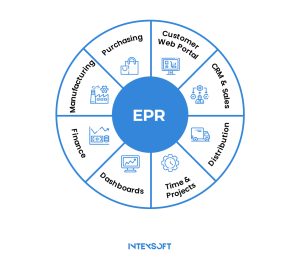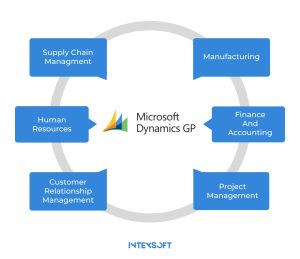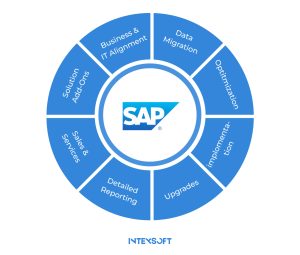
This article comprehensively explores the integration between Enterprise Resource Planning (ERP) systems and ecommerce platforms. You will discover the benefits of this combination for your online stores and learn about the best ERP solutions available today. For more personalized information, feel free to contact our experts anytime.
Reading time: 23 min.
ERP ecommerce platforms are a familiar topic for you as an ecommerce business owner.
Ecommerce ERPs play a versatile role, from monitoring procurement to logistics and financial management. These systems automate tasks, offer insights, and refine workflows.
A robust ERP software uplifts ecommerce efficiency, allowing websites to achieve more while utilizing fewer resources.
On a global scale, the ERP market is poised to hit $100 billion by 2025, boasting an array of significant players. To make informed decisions about integrating a new system, decision-makers must grasp ERPs’ full potential and limitations.
In this post, IntexSoft will explore the advantages of integrating ERP with online companies. We’ll also discuss the important features to consider, how to make it work, and how to choose the right solution for your needs.
ERP, short for Enterprise Resource Planning, is an all-in-one toolbox for businesses. It serves as a multifaceted instrument that enhances various company operations. Visualize it as a superhero for streamlining business processes. Its capabilities encompass tasks such as monitoring customers and ensuring their satisfaction (known as Customer Relationship Management or CRM), issuing invoices, sales customer order management, procuring the appropriate materials for production, closely managing supply chain operations, project management, risk management and compliance, overseeing financial transactions and allocation (accounting), business intelligence, and much more.
ERP solutions have a secure and centralized data repository. So everyone in the organization right from the executives, managers and employees of different departments, clients and other stakeholders are able to access the same, updated and error-free ERP data.

Now, envision this superhero tool seamlessly integrating with your online store – this synergy is termed ERP ecommerce integration. This integration amplifies the potency of your ecommerce enterprise by synergizing your in-store and online sales under one big strategy.
In the table below, you will discover ERP features for ecommerce that can enhance your company in the long run.
| Feature of ecommerce ERP | Benefits for online businesses |
| Customer Relationship Management | CRM software helps retain customers by nurturing leads and offering personalized experiences. Retaining existing customers is more cost-effective than acquiring new ones. Factors like efficient shipping notifications, personalized ads, and accessible customer service contribute to customer loyalty. |
| Shipping and distribution | Personalized communication and finely tuned promotions. Just amalgamate customer information (every order is meticulously recorded) with sources like in-store visits. Once an order undergoes processing in your ERP system, its status is promptly reflected in the customer’s account on the website, empowering them to monitor their order’s progression. |
| Smart inventory management and replenishment | Seamless inventory synchronization due to linking your ERP with your website facilitates. As a customer places an online order, the ERP system dynamically updates inventory figures. This real-time display provides you an immediate overview of product availability for each item. Conversely, when stock levels are restored, both the ERP system and your ecommerce platform are simultaneously updated. |
| Managing inventory levels | Elevating the overall customer experience. This synchronized inventory management approach mitigates customer disappointment arising from out-of-stock products. |
| Payments | Following order verification and payment processing, the billing particulars are seamlessly transmitted to the ERP platform for handling by your accounting department. Frequently, the ERP system autonomously manages payment reminders. |
Integrating an ERP system can offer numerous advantages to ecommerce websites. Due to their fast-paced operations and high transaction volumes, adopting a dedicated solution equipped with automation features and links to financial data can lead to significant benefits. Here, we’ll explore some of the distinctive advantages that ecommerce businesses can experience when integrating their ecommerce platforms with ERP systems.
When companies integrate ERP and ecommerce, they should understand key approaches. Choosing the right deployment for your ecommerce ERP software depends on specific needs. While the cloud often fuels innovation, it may not always be the best fit for critical business functions. The level of customization and flexibility can vary significantly.
There are three ways to implement ERP ecommerce system:
When selecting an ERP software, businesses should consider factors such as their industry, size, scalability, customization options, integration capabilities, and overall business goals. ERP software plays a crucial role in modern businesses by providing a holistic approach to managing operations and fostering growth in an increasingly competitive market.
Here are some notable examples of ERP e commerce systems that cater to various business needs and industries:
Let’s learn more about some of the most popular options today.
Microsoft Dynamics goes beyond traditional ecommerce software – it’s a suite of powerful business tools crafted by Microsoft. Its goal is to help businesses of all sizes embrace digital transformation across various areas like sales, marketing, customer service, operations, and HR. Importantly, Microsoft Dynamics serves as both an advanced customer relationship management and ERP ecommerce software.

Some standout features of Microsoft Dynamics include:
It’s important to note that Microsoft Dynamics isn’t free, but you can explore its capabilities with a 30-day trial. This trial period gives the chance to explore how Microsoft Dynamics can benefit ecommerce businesses before owners decide to invest financially.
Odoo emerges as a transformative force. With a global footprint encompassing 120 countries, this powerhouse offers a suite of applications to span a broad spectrum of ecommerce operations.
Odoo’s modules include CRM (customer relations), accounting, invoicing, inventory and workforce management, website creation, HR management, and project management.
You can empower ecommerce business with Odoo:
A pivotal aspect of Odoo’s appeal lies in its swift and streamlined invoicing mechanism. Invoices can be efficiently dispatched to customers via email, complemented by user-friendly options for online payments through renowned platforms like PayPal, Authorize.net, Stripe, and others.
Odoo presents the strategic advantage of consolidating essential tools for ecommerce company management under a unified umbrella. However, this convenience comes with costs that scale as you expand your toolkit.
Following a pay-per-use model, Odoo’s pricing structure hinges on two pivotal factors:
The pricing structure for this ecommerce ERP system is designed to accommodate different needs and budgets. Generally, the cost falls within $12 to $36 per user per month, depending on the specific modules you choose.
SAP stands out as a powerhouse among cloud ERP software, holding a top spot among the most influential business software companies globally.
This ecommerce ERP offers a wide range of solutions designed to cater to businesses of all sizes – from small and medium-sized enterprises to large ecommerce companies.

SAP’s ERP ecommerce integration brings together a variety of functions, including:
The cost of SAP cloud ERP ecommerce software depends on various factors, including:
Sage offers a very well-developed platform designed to streamline ecommerce business management. Its focus revolves around an entirely online tool for managing accounting and invoices. Sage’s ERP ecommerce software proves valuable for a diverse range of users, including self-employed individuals, professionals, and small to medium-sized enterprises, benefitting from its adaptable capabilities.
Sage’s ERP ecommerce integration encompasses the following:
Sage’s ERP ecommerce offers a generous 3-month free trial period, allowing ample time for exploration. Transitioning to the paid plan starts at an affordable rate of $12 per user per month.
Epicor Software stands as a global leader in offering specialized enterprise software solutions. With over 45 years of experience, the Epicor ERP platform provides flexible business software designed specifically for manufacturing businesses.
With a deep understanding of various industries, Epicor ERP software can help your online business perform better, increase profitability, and facilitate smoother growth.
Epicor ERP offers a wide array of features, including:
Epicor ERP is designed to cater to the needs of today’s users, providing flexibility, choice, and agility to drive growth and opportunities for your online business.
Epicor presents an attractive deal with a $175 per user per month pricing model with a wide range of features that can genuinely uplift your ecommerce endeavors. The best part? This cost-effective pricing means you can fully leverage Epicor’s capabilities without putting a strain on your budget.
Oracle NetSuite offers unique advantages that go beyond the capabilities of traditional spreadsheets and standalone software.
Key benefits:
NetSuite SuiteSuccess packages are available in two editions: Standard and Premium, each offering distinct sets of features. The pricing for these editions also varies, with the Standard edition starting at $1,299 per month and the Premium edition going up to $9,999 monthly. This flexible pricing approach empowers ecommerce businesses to select the edition that aligns with their specific needs and budget, providing them with a tailored and cost-effective solution.
As an ecommerce business grows, its operations become more complex. This is when an ERP solution becomes valuable. The strength of successful ERP ecommerce integration lies in its ability to support scalability and expansion. By identifying ways to work more efficiently and improving procedures, these integrations are crucial for businesses of all sizes – whether they’re startups, medium-sized ecommerce ventures, or established industry leaders.
These ERP ecommerce integrations influence customer interactions and internal processes, creating a more robust business structure. The result is a business well-equipped for enhanced performance and adaptability.
Contact us to learn more and take the first step. Let’s establish a successful ERP ecommerce integration for you company.
ERP (Enterprise Resource Planning) for e-commerce is a software that streamlines and centralizes various business operations. It manages inventory, orders, customer relationships, and finances, providing a unified view and automating processes. Think of it as your business’s smart assistant, keeping things organized and efficient, so you can focus on growth.
Using ERP software for e-commerce brings numerous benefits to businesses of all sizes:
There are a few best ERP software options for ecommerce that are often considered suitable for ecommerce businesses based on their features and capabilities:
When searching for an ERP platform suitable for ecommerce, it’s crucial to identify essential features that can optimize your online business operations. Here are some vital aspects to consider:
Ecommerce ERP software enhances ecommerce inventory management by offering real-time monitoring of stock levels, automating order processing, and integrating inventory data from various channels. It helps maintain optimal stock levels to avoid shortages or excess, and supports effective collaboration with suppliers for timely restocking. Furthermore, many ERP systems improve returns handling, enable batch and lot tracking for quality control, provide valuable insights through analytics, and seamlessly integrate with shipping for precise order fulfillment. They also ensure accurate financial records by representing inventory values.
ERP software is like the command center for ecommerce businesses. It brings together different parts of the business, making things run smoothly. It helps manage stuff like keeping track of how much stuff you have, processing orders so customers get their things on time, and using data to figure out what’s working and what’s not. ERP also keeps all the customer info in one place so you can give better service. It takes care of money matters like sending invoices and calculating taxes. If you run out of things, it helps you work with suppliers to get more. As your business grows, ERP software grows with you and connects all the different parts so they work well together.